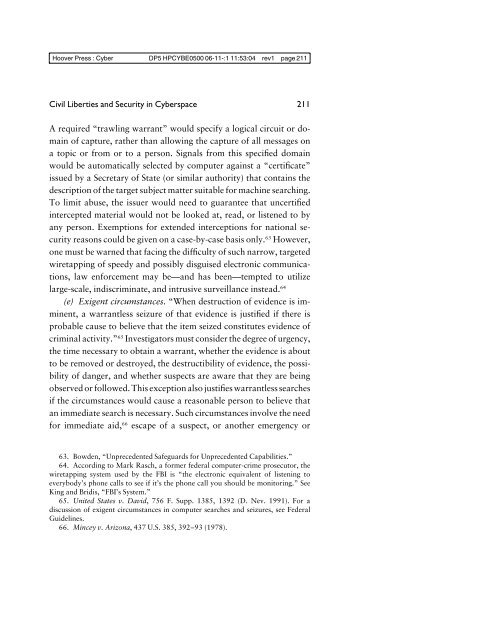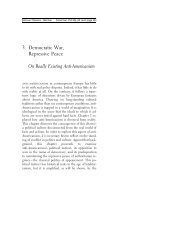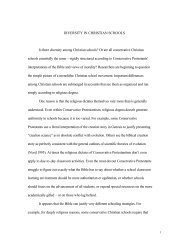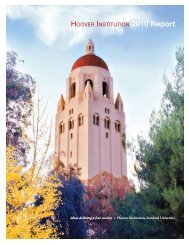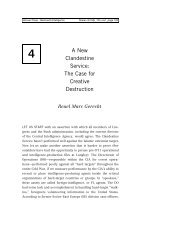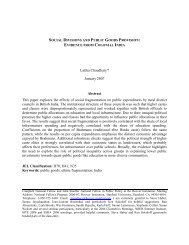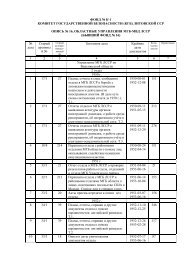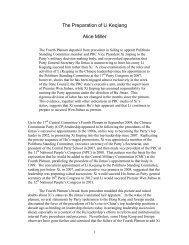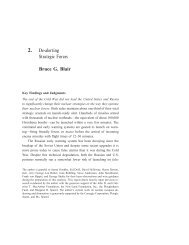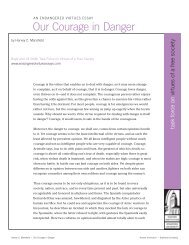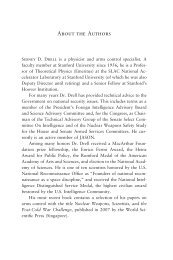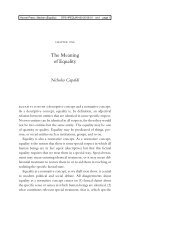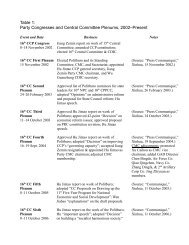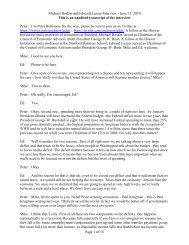Civil Liberties and Security in Cyberspace - Hoover Institution
Civil Liberties and Security in Cyberspace - Hoover Institution
Civil Liberties and Security in Cyberspace - Hoover Institution
Create successful ePaper yourself
Turn your PDF publications into a flip-book with our unique Google optimized e-Paper software.
<strong>Hoover</strong> Press : Cyber DP5 HPCYBE0500 06-11-:1 11:53:04 rev1 page 211<br />
<strong>Civil</strong> <strong>Liberties</strong> <strong>and</strong> <strong>Security</strong> <strong>in</strong> <strong>Cyberspace</strong><br />
211<br />
A required “trawl<strong>in</strong>g warrant” would specify a logical circuit or doma<strong>in</strong><br />
of capture, rather than allow<strong>in</strong>g the capture of all messages on<br />
a topic or from or to a person. Signals from this specified doma<strong>in</strong><br />
would be automatically selected by computer aga<strong>in</strong>st a “certificate”<br />
issued by a Secretary of State (or similar authority) that conta<strong>in</strong>s the<br />
description of the target subject matter suitable for mach<strong>in</strong>e search<strong>in</strong>g.<br />
To limit abuse, the issuer would need to guarantee that uncertified<br />
<strong>in</strong>tercepted material would not be looked at, read, or listened to by<br />
any person. Exemptions for extended <strong>in</strong>terceptions for national security<br />
reasons could be given on a case-by-case basis only. 63 However,<br />
one must be warned that fac<strong>in</strong>g the difficulty of such narrow, targeted<br />
wiretapp<strong>in</strong>g of speedy <strong>and</strong> possibly disguised electronic communications,<br />
law enforcement may be—<strong>and</strong> has been—tempted to utilize<br />
large-scale, <strong>in</strong>discrim<strong>in</strong>ate, <strong>and</strong> <strong>in</strong>trusive surveillance <strong>in</strong>stead. 64<br />
(e) Exigent circumstances. “When destruction of evidence is imm<strong>in</strong>ent,<br />
a warrantless seizure of that evidence is justified if there is<br />
probable cause to believe that the item seized constitutes evidence of<br />
crim<strong>in</strong>al activity.” 65 Investigators must consider the degree of urgency,<br />
the time necessary to obta<strong>in</strong> a warrant, whether the evidence is about<br />
to be removed or destroyed, the destructibility of evidence, the possibility<br />
of danger, <strong>and</strong> whether suspects are aware that they are be<strong>in</strong>g<br />
observed or followed. This exception also justifies warrantless searches<br />
if the circumstances would cause a reasonable person to believe that<br />
an immediate search is necessary. Such circumstances <strong>in</strong>volve the need<br />
for immediate aid, 66 escape of a suspect, or another emergency or<br />
63. Bowden, “Unprecedented Safeguards for Unprecedented Capabilities.”<br />
64. Accord<strong>in</strong>g to Mark Rasch, a former federal computer-crime prosecutor, the<br />
wiretapp<strong>in</strong>g system used by the FBI is “the electronic equivalent of listen<strong>in</strong>g to<br />
everybody’s phone calls to see if it’s the phone call you should be monitor<strong>in</strong>g.” See<br />
K<strong>in</strong>g <strong>and</strong> Bridis, “FBI’s System.”<br />
65. United States v. David, 756 F. Supp. 1385, 1392 (D. Nev. 1991). For a<br />
discussion of exigent circumstances <strong>in</strong> computer searches <strong>and</strong> seizures, see Federal<br />
Guidel<strong>in</strong>es.<br />
66. M<strong>in</strong>cey v. Arizona, 437 U.S. 385, 392–93 (1978).


